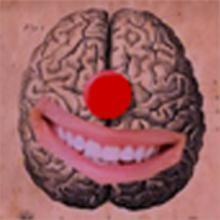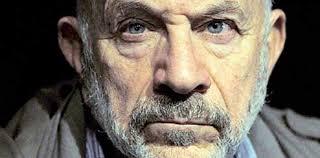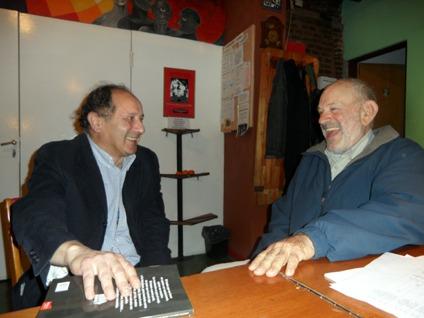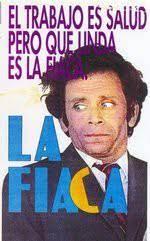
Norman Briski: "No me dedico al Teatro por dinero"

Brillante, original, fuera de serie, refractario, estilete incesante de las lacras societales y rebelde con o sin causa. Le han dicho de todo a Norman Briski, pero –paradojalmente- hasta quienes lo fustigan no dejan de admitir su proverbial talento. Eso ya merece párrafo aparte, en un medio reticente a reconocer la valía de sus congéneres. Pensé que me iba a encontrar con un tipo cálido/distante. Esta vez me falló la intuición.
De risa fácil, buen conversador y mejor contertulio, le sobra eso que los franceses llaman savoir faire y que no es otra cosa que una proverbial capacidad de situarse en escenarios diferentes. Es la vida, el recorrido, la cancha… o la experiencia, si usted quiere.
Considera que el genuino actor nace y se hace.
-“Generalmente uno quiere elegir entre una cosa o la otra, pero en muchas ocasiones sucede que las dos se unen”.
Mucho más que un artista, pocos saben de su paso como bailarín en el Teatro Colón. Fue un gran mimo -¿o lo sigue siendo?- aunque admite que se le fue la gracia:
-“Lo que pasa es que uno va creciendo. El hecho de no emplear la palabra corresponde a una etapa infantil;y la expresión corporal va relacionada con la falta de lenguaje”.
Declara que el teatro que lo busca y lo inunda no quiere ser revolucionario, sino revulsivo.
Hoy ya ajeno al domicilio político, creo que Briski es un anarquista en el fondo, un conservador en la forma y un iconoclasta en su esencia.
Me resulta difícil describir su estilo teatral, algo desenvuelto y no por ello menos serio. Parece que ahí está la gracia. Aunque creo que en la incitación se alberga el embrujo con que captura a sus espectadores y lectores.
Sin duda que el Teatro argentino ha tenido momentos mejores, aunque –alicaído o anémico- seguirá siendo un referente obligado para el teatro chileno.
El teatro bonaerense de hoy es muy distinto al de hace un par de décadas. Y ello se trasunta de una manera tajante: el teatro de hoy refleja la moral de hoy;y la moral de hoy no es la de hace veinte años, menos laxa y sin esos tintes de relativismo que sirven para justificar cualquier acto esperpéntico. El teatro de hoy en el vecino país no solo refleja esa moral dislocada (lacra sudamericana, creo) sino que la desnuda, la empuja pero también la sacude.
La función del verdadero hombre de teatro es la función de un intelectual que no obedece a ninguna bandera partidista y no se prosterna frente a las corrientes en boga. Debe permanecer en estado de vigilia para denunciar a través de este medio de expresión que es el Teatro las alienaciones que nos rodean. Esto lo sintetiza de modo magistral el pensador argentino Víctor Massuh cuando asegura que “el intelectual que se pone al servicio de un poder constituido –sea éste revolucionario o no- rebaja su actividad al nivel de propaganda o de panfleto”.
Que no se discuta algo que ya alcanzó trazas de axioma…
Y es que el intelectual es un paladín de la liberación, de la comunidad, y no debe pringar jamás esa noción tan prístina como inmaculada.

Jorge Abasolo y Norman Briski en Buenos. Aires
EL HOMBRE DE LA FIACA
Norman Briski inició su carrera a mediados de los años cincuenta con la obra teatral “La Farsa del señor Corregidor” en la provincia de Córdoba en lugar donde nació y se crió.
Entre sus más destacados trabajos interpretativos se destacan “La Fiaca”, “Otros Paraísos” y “Rosencranz y Guildenstern han muerto”.
En lo tocante al cine, podemos destacar los siguientes filmes, donde sobresalía ante sus compañeros de ruedo; bajo la dirección de Carlos Saura, “Elisa, vida mía” y “Mamá cumple cien años”; “La Peste” de Luis Puenzo; “La sonámbula” bajo el mando de Fernando Spiner, entre otras producciones de diversos géneros.
Como personaje televisivo, ha tenido numerosos papeles protagónicos y apariciones especiales, como en: “Uno más uno”, “Sin Condena”, “La bonita Página”, la miniserie “Bajamar”, por la cual consiguió un premio Martín Fierro y finalmente “Tiempo Final”, por la que obtuvo su segundo Martín Fierro.
Como dramaturgo obtuvo el premio Clarín al mejor autor argentino gracias a su obra “Rebatibles”. Además escribió “El astronauta”, “Con la cabeza bajo el agua”, “Verde Oliva”, entre algunas obras más.
Entre sus últimas obras en cartel se encuentran “Fin de Siglo” y “El alquiler de la sombra”, que se hicieron en el teatro Calibán, por supuesto, dirigidas y escritas por si mismo.
Como director, se ha propuesto llevar al teatro diversas versiones sus propias obras, así como también algunas de otros autores: “Potestad”, “El señor Galíndez”, “La gran Marcha” de Tato Pavlovsky, “Poroto”, y “Sol y Luna” con el Dragon Dance Theater.
Continuamente se dedica a ser docente de actores. En su trayectoria ha formado más de un grupo y talleres de teatro popular. En estos tiempos se encuentra dirigiendo y escribiendo obras para el Grupo Brazo Largo.
Muchos de sus textos dotados de experiencia han salido en publicaciones de diarios y revistas.
-¿Por qué no siguió usted en la comedia y viró hacia el Teatro serio?
-Lo que pasa es que el social histórico se aleja de la comedia. Yo no me alejo de las cosas tan intensas como pudo ser “La Fiaca” en su momento. En la actualidad han declinado muchísimo las producciones referidas a temas que tienen contenido social, que tienen su densidad…eso en la Argentina ha caído estrepitosamente. Y no solo en lo que se refiere a una comedia que esté hablando de la sociedad donde vive, o de aspectos de la sociedad en que se vive. No. Acá se han caído muchísimas cosas, por más que haya una apariencia auspiciosa. Y como el cine y la televisión dependen mucho del dinero, ese apto no serviría más que para un entretenimiento vano, que es lo que está primando hoy. En la actualidad nadie está poniendo ni capital ni trabajo para hacer cosas más interesantes que se hicieron en el pasado. Y no me refiero solo al cine, al teatro o la televisión. Hoy no tenemos ese nivel, y creo que es porque la Argentina ha sufrido episodios lo suficientemente drásticos como para que nadie esté en la comedia.
-Racine decía que en períodos desgarradores es cuando asoman mayores grados de creatividad…
-En alguna etapa de algunas dictaduras –que serían las últimas etapas- apareció acá el teatro abierto. Asomó una idea libertaria, de cierta expresión cultural. Esto me recuerda la cultura que imperó en Alemania, en el período hitleriano. Si nos acordamos bien, lo que cundía en esa época era lo que habían escrito personas como Wagner o Beethoven, pero la expresión de ese período no existió. Fue nula.
-Acá en Buenos Aires he visto mucha ramplonería en la televisión. En Chile, un amigo mío –gran actor de Teatro- me dijo que había tenido que prostituirse y hacer televisión, donde pagan mejor. ¿Es el drama de muchos actores también en la Argentina de hoy?
-Yo creo que es más que un drama. Es una tragedia. Pero el actor tiene esa cosa mefistofélica. Basta que esté presente en la televisión y aguanta cualquier cosa patronal.
-En una entrevista usted dijo que los neoyorquinos le resultaron más cercanos que los españoles. ¿Cómo así?
-Convengamos en que yo soy anti imperialista, pero no soy anti norteamericano. En Estados Unidos conocí a gente de una enorme sensibilidad y muy solidaria. Una cosa es lo que significa Estados Unidos y otra cosa es lo que son. Hay muchísimas personas de un gran valor.
Yo tengo el mejor de los recuerdos de mi estadía en ese país.
Este “Teatro Calibàn”, este lugar donde estamos sentados ahora, es la consecuencia de la venta del departamento que yo tenía en Nueva York.
Y ha sido construido en comunidad con chilenos, argentinos y peruanos.
Lo que pasa es que acá en la Argentina tuvo un gran devenir sobre lo que significó Stanislawsky y su cultura en términos teatrales. Y Nueva York también está imbuida de esa cultura stanilavskiana. Entonces, hay una similitud de cierto devenir de técnicas y de maneras de trabajar en el castellano y el inglés, cosa que no pasó ni en Italia ni en Francia.
-¿Se permeó usted de la idiosincrasia del neoyorquino?
-¡Pero sin ninguna duda! Yo viví casi seis años allí.
Ustedes mismos los chilenos –en el ámbito del teatro- han tenido cierta conexión con Inglaterra, en el sentido de que todos los realizadores chilenos, en algún momento, fueron a conectarse y nutrirse con los ingleses.
-Tengo entendido que estando en Nueva York usted compartió con Richard Burton…
-Así es.
-¿Cómo era en el trato coloquial?
-Era un tipo extremadamente simpático. Muy simpático…muy veloz y muy seductor. Un seductor como pocas personas he conocido en mi vida.
También conocí a Paul Newman y a Robert Redford.
-¿No quiso quedarse allá? ¿Por qué volvió?
-Yo creo que si no hubiese llegado la democracia en la Argentina, yo estaría convertido en un “neoyorquero”…caminando por el río.
Pero la verdad es que yo apenas pude volver al país, lo hice. Me parece que esta es mi tierra, este es mi lugar. Afuera yo enseñaba lo que sabía. No aprendía tanto. En cambio acá es distinto, pues yo estoy aprendiendo todo el tiempo. Hay una mayor exigencia, en el sentido de que tenés que ser eficaz en tu trabajo.
-Como decía mi padre, “el que enseña aprende dos veces”…
-Está buena esa, ¿eh? Es cierto eso…muy cierto.
-¿Todo hombre de Teatro debe ser antisistémico?
-No. Lo que no tiene que ser es de un solo sistema.
-Habrá que buscar un sistema que nos cobije a todos…
-La epistemología. (Nos reímos)
Hay que tener en cuenta que toda metodología es estudiable, referencial… y puede ser extremadamente reproductiva si es que no somos sectarios.
-Hasta hoy en Chile algunos actores vienen a nutrirse de buen Teatro acá a Buenos Aires. Acá mucha gente me ha dicho que el Teatro ha tenido épocas mejores. ¿Cuál ha sido la etapa de oro del Teatro argentino?
-Yo soy más bien de un Teatro independiente. Claro, hay momentos del teatro argentino que han sido mucho más activos, más interesantes y hasta más inquietantes. Hasta la década del 60 acá había un teatro de calidad.
-Usted era entonces un niño…
-No tan niño…pero lo suficientemente juguetón como para haber estado protagonizando un movimiento con cierta importancia. La verdad es que sería irresponsable de mi parte decirte que yo conozco hoy el teatro argentino. No tengo idea de lo que está pasando, así que también es atrevido empezar a analizar lo que está pasando en el teatro de acá.
-Pero usted es un referente obligado del este quehacer en la Argentina, y todos le ubican y le respetan…
-Seguro…pero el hecho de que yo sea un referente no significa que sea un conocedor de lo que está pasando en los 140 grupos de teatro que hay en Buenos Aires.
-Pero uno tiene siempre un pálpito, esa sensación térmica que llaman…
-La sensación térmica me dice que una gran porción de ellos está en la especulación posmoderna. La otra porción se debate en un cierto snobismo improductivo y curioso por su cantidad.
Y –por supuesto- existen grupos con muchísimo interés por hacer trabajos serios, con actores, directores y todo lo que conlleva un trabajo hecho en serio. Pero, es la minoría absoluta. Son contados con los dedos de una mano.

“La Fiaca” fue la película que posicionó a Briski internacionalmente.
Como toda comedia excepcional, tiene varias lecturas
Norman Briski: "I do not dedicate myself to the Theater for money"
Brilliant, original, out of the ordinary, refractory, an incessant stiletto of societal scourges and a rebel with or without a cause. They have told Norman Briski everything, but -paradoxically- even those who criticize him do not stop admitting his proverbial talent. That already deserves a separate paragraph, in an environment that is reluctant to recognize the worth of its peers. I thought I was going to meet a warm/distant guy. This time my intuition failed me.
With an easy laugh, a good conversationalist and a better conversationalist, he has plenty of what the French call savoir faire and which is nothing more than a proverbial ability to place himself in different scenarios. It's life, the course, the field... or the experience, if you want.
He believes that the genuine actor is born and made.
-"Generally one wants to choose between one thing or the other, but on many occasions it happens that the two come together."
Much more than an artist, few know of his time as a dancer at the Teatro Colón.
It was a great mime - or is it still? - although he admits that he lost his grace:
“What happens is that one is growing. The fact of not using the word corresponds to a childhood stage; and the corporal expression is related to the lack of language”.
He declares that the theater that seeks him out and floods him does not want to be revolutionary, but rather revulsive.
Today, no longer a political domicile, I believe that Briski is an anarchist at heart, a conservative in form and an iconoclast in essence.
I find it difficult to describe his theatrical style, somewhat brash and no less serious. It seems that therein lies the trick. Although I believe that the enchantment with which it captures its viewers and readers is housed in the incitement.
Undoubtedly, the Argentine Theater has had better moments, although - depressed or anemic - it will continue to be an obligatory reference for Chilean theater.
Buenos Aires theater today is very different from that of a couple of decades ago. And this is evident in a clear way: today's theater reflects today's morality; and today's morality is not that of twenty years ago, less lax and without those overtones of relativism that serve to justify any grotesque act. Today's theater in the neighboring country not only reflects that dislocated morality (a South American scourge, I think) but also strips it, pushes it but also shakes it.
The function of the true man of the theater is the function of an intellectual who does not obey any partisan flag and does not prostrate himself in front of the currents in vogue. He must remain in a state of vigil to denounce through this means of expression that is the Theater the alienations that surround us. This is summed up masterfully by the Argentine thinker Víctor Massuh when he asserts that “the intellectual who places himself at the service of a constituted power –whether revolutionary or not- lowers his activity to the level of propaganda or pamphlet”.
That something that has already reached traces of an axiom should not be discussed...
And it is that the intellectual is a champion of liberation, of the community, and should never mess with that notion as pristine as it is immaculate.
THE MAN OF THE FIACA
Norman Briski began his career in the mid-fifties with the play "La Farsa del señor Corregidor" in the province of Córdoba, where he was born and raised.
Among his most outstanding interpretive works are "La Fiaca", "Otros Paraísos" and "Rosencranz and Guildenstern have died".
Regarding the cinema, we can highlight the following films, where he stood out from his companions in the arena; under the direction of Carlos Saura, “Elisa, my life” and “Mama celebrates her hundredth birthday”; "La Peste" by Luis Puenzo; "La somnambula" under the command of Fernando Spiner, among other productions of various genres.
As a television character, he has had numerous leading roles and special appearances, such as: “One plus one”, “Sin Condena”, “La bonita Página”, the miniseries “Bajamar”, for which he won a Martín Fierro award and finally “ Final Time”, for which he obtained his second Martín Fierro.
As a playwright, he won the Clarín award for the best Argentine author thanks to his work “Rebatibles”. He also wrote "El astronauta", "Con la cabeza bajo el agua", "Verde Oliva", among other works.
Among his latest works on the bill are "Fin de Siglo" and "El alquiler de la sombra", which were made at the Calibán theater, of course, directed and written by himself.
As a director, he has set out to take various versions of his own works to the theater, as well as some by other authors: “Power”, “El señor Galíndez”, “La gran Marcha” by Tato Pavlovsky, “Bean”, and “Sol y Luna” with Dragon Dance Theater.
He continually dedicates himself to teaching actors. In his career he has formed more than one popular theater group and workshops. In these times he is directing and writing works for the Brazo Largo Group.
Many of his experienced texts have appeared in newspaper and magazine publications.
-Why didn't you continue in comedy and turn towards serious theater?
-What happens is that the historical social moves away from comedy. I don't stay away from things as intense as “La Fiaca” could have been at the time. At present, the productions referring to topics that have social content, that have their density have declined a lot... that in Argentina has fallen resoundingly. And not only in what refers to a comedy that is talking about the society where you live, or aspects of the society in which you live. No. Many things have fallen here, even though there is an auspicious appearance. And since cinema and television depend a lot on money, this apt would only serve for vain entertainment, which is what is taking precedence today. Today no one is putting in capital or labor to do more interesting things than were done in the past. And I am not referring only to the cinema, the theater or television. Today we don't have that level, and I think it's because Argentina has suffered sufficiently drastic episodes so that no one is in comedy.
-Racine said that in heartbreaking periods is when greater degrees of creativity appear...
-At some stage of some dictatorships –which would be the last stages- the open theater appeared here. A libertarian idea appeared, of a certain cultural expression. This reminds me of the culture that prevailed in Germany, in the Hitlerian period. If we remember correctly, what was widespread at that time was what people like Wagner or Beethoven had written, but the expression of that period did not exist. It was null.
-Here in Buenos Aires I have seen a lot of vulgarity on television. In Chile, a friend of mine –a great theater actor- told me that he had had to become a prostitute and do television, where they pay better. Is the drama of many actors also in today's Argentina?
I think it's more than a drama. It's a tragedy. But the actor has that Mephistophelian thing. It is enough that he is present on television and puts up with anything bossy.
-In an interview you said that the New Yorkers were closer to you than the Spanish. In that way?
- Let's agree that I am anti-imperialist, but I am not anti-American. In the United States I met people of enormous sensitivity and great solidarity. One thing is what the United States means and another thing is what they are. There are many people of great value.
I have the best memories of my stay in that country.
This “Teatro Calibàn”, this place where we are sitting now, is the consequence of the sale of the apartment that I had in New York.
And it has been built in community with Chileans, Argentineans and Peruvians.
What happens is that here in Argentina there was a great evolution about what Stanislawsky and his culture meant in theatrical terms. And New York is also imbued with that Stanilavskian culture. So, there is a similarity of a certain evolution of techniques and ways of working in Spanish and English, something that did not happen in Italy or France.
-Did you permeate the idiosyncrasy of the New Yorker?
-But without a doubt! I lived almost six years there.
You Chileans yourselves –in the field of theater- have had a certain connection with England, in the sense that all Chilean filmmakers, at some point, went to connect and nourish themselves with the English.
-I understand that while in New York you shared with Richard Burton...
-That's how it is.
-How was he in the colloquial treatment?
He was an extremely nice guy. Very nice… very fast and very seductive. A seducer like few people I have met in my life.
I also met Paul Newman and Robert Redford.
Didn't you want to stay there? Why did he come back?
-I believe that if democracy had not arrived in Argentina, I would have become a "New Yorker"... walking along the river.
But the truth is that as soon as I was able to return to the country, I did. It seems to me that this is my land, this is my place. Outside I taught what I knew. I didn't learn that much. On the other hand, here it is different, because I am learning all the time. There is a greater demand, in the sense that you have to be effective in your work.
-As my father used to say, "he who teaches learns twice"...
-That's good, huh? That is true… very true.
-Every theater man must be anti-systemic?
-No. What does not have to be is a single system.
-We will have to find a system that covers us all...
-Epistemology. (We laugh)
It must be taken into account that all methodology is studyable, referential... and can be extremely reproductive if we are not sectarian.
-Until today in Chile some actors come to feed themselves from good theater here in Buenos Aires. Here many people have told me that the Theater has had better times. What has been the golden stage of the Argentine Theater?
-I am more of an independent theater. Of course, there are moments in the Argentine theater that have been much more active, more interesting and even more disturbing. Until the 1960s there was a quality theater here.
You were a child then...
-Not so young... but playful enough to have been leading a movement of some importance. The truth is that it would be irresponsible of me to tell you that I know the Argentine theater today. I have no idea what is happening, so it is also daring to start analyzing what is happening in the theater here.
-But you are an obligatory referent of this task in Argentina, and everyone places you and respects you...
-Sure… but the fact that I am a reference does not mean that I am an expert on what is happening in the 140 theater groups that exist in Buenos Aires.
-But one always has a feeling, that thermal sensation that they call…
-The wind chill tells me that a large portion of them is in postmodern speculation. The other portion is debated in a certain unproductive and curious snobbery due to its quantity.
And -of course- there are groups with a lot of interest in doing serious work, with actors, directors and everything that a serious job entails. But, it is the absolute minority. They are counted on the fingers of one hand.
